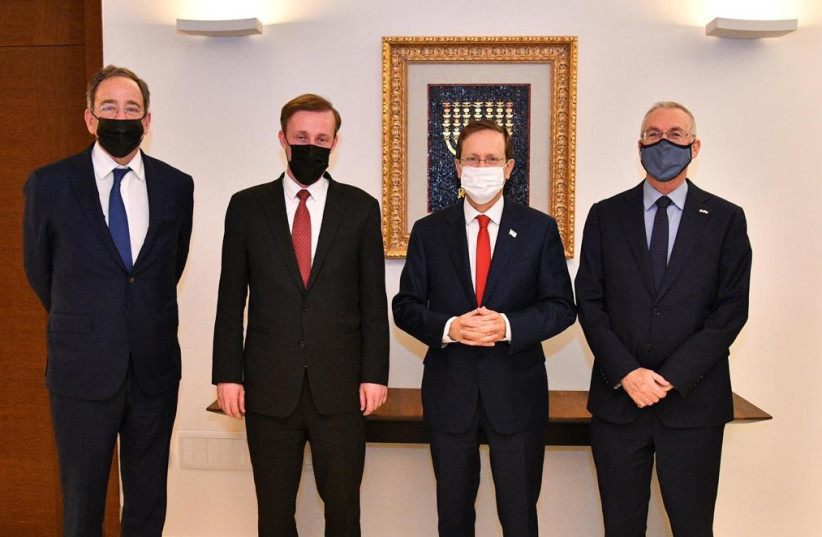Iran is using negotiations with world powers to buy time as it works on a nuclear weapon, President Isaac Herzog warned US National Security Advisor Jake Sullivan in a meeting Tuesday night.
“The President underscored the need to stop Iran from obtaining nuclear weapons, at any price,” the President's Residence said.
Herzog described the Middle East as divided into “a coalition of Israel and Arab states pursuing peace, resisting Iran and working toward a better world for their citizens, and Iran's coalition of terror with its proxies, which seeks to destabilize the region."
The president said he is concerned “with Iran's progress toward nuclear weapons under the cover of the negotiations in Vienna."
The negotiations in Vienna between Iran and world powers for the Islamic Republic and America to return to the 2015 Joint Comprehensive Plan of Action nuclear deal went on hiatus last week, and are not expected to resume until next week at the earliest.

During the talks, Iran presented a draft agreement reversing all progress in earlier rounds of talks from April through June, leading the European parties to the talks – Britain, France and Germany, known as the E3 – to express frustration at the process and say time is running out for Iran to return to the JCPOA.
A senior Biden administration official said ahead of Sullivan’s visit that “the threat posed by Iran, particularly its nuclear program, but also its destabilizing activities in the region” was a top item on the National Security Advisor’s agenda for his visit to Israel, which includes meetings with Prime Minister Naftali Bennett and a meeting of the Strategic Consultative Group, co-chaired by Sullivan and his Israeli counterpart Eyal Hulata.
“The US and Israel are totally aligned in our determination to ensure Iran can never acquire a nuclear weapon and we've had a very active dialogue about our approach on that,” the official said.
"We share with our Israeli partners a deep concern about the advancements in Iran's nuclear program... following the previous administration's withdrawal from the JCPOA without much thought or plan as to what would come next, and we've just seen this dramatic acceleration of Iran's nuclear program since then,” he added.
Also at the Herzog-Sullivan meeting were Ambassador to the United States Mike Herzog and US Ambassador to Israel Tom Nides.
Herzog expressed appreciation for US President Joe Biden’s support for Israel.
Bet Hanassi declined to respond as to whether Herzog discussed the Dimentman family’s request that Israel legalize the Homesh Yeshiva in the West Bank, as the president said he would during a condolence visit on Tuesday.
Yehuda Dimentman, 25, was killed by Palestinian gunmen on Thursday as he left the Homesh Yeshiva where he studied.
The family has called on Bennett to authorize the yeshiva and a settlement on that hilltop in Yehuda’s name so that his death will not be in vain. The US has repeatedly urged Israel not to engage in any settlement activity, particularly building in isolated areas of the West Bank.
“Tonight, I am the first person who will receive the US National Security Advisor, Jake Sullivan, a friend of Israel. He is arriving here for two days and is arriving at my home late with his staff,” Herzog said in a recording from the shiva call during the week-long mourning period. “I will tell him about your family and I will tell him about your request.”
He cautioned them that the request could not just be viewed from a humanitarian perspective because it had regional and international implications.
The Homesh Yeshiva is located on a hilltop considered to be private Palestinian property from the nearby village of Burka.
Homesh was one of four settlements in Samaria that Israel destroyed in 2005 in the aftermath of the Gaza pullout. The other three – Kadim, Ganim and Sa-Nur – were all built on state land.
In the aftermath of the Gaza pullout, the yeshiva illegally returned to the site with modular buildings that are periodically destroyed by the IDF.
Separately, the High Court of Justice has ruled that Palestinians from Burka can access the hilltop only so that they can farm their land.
